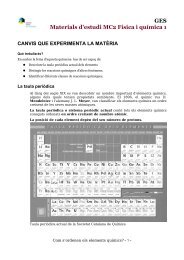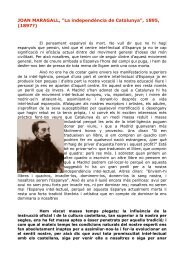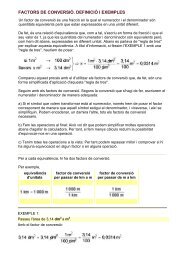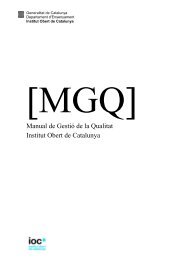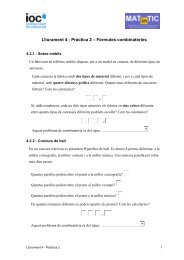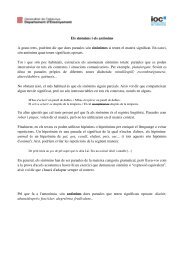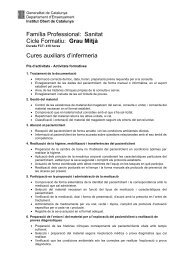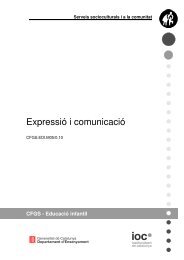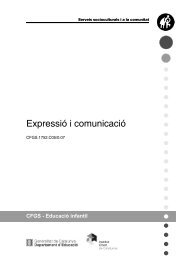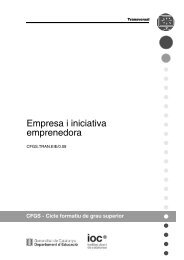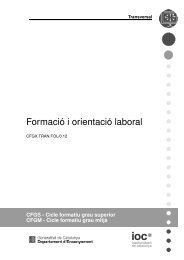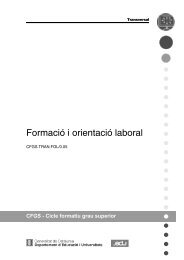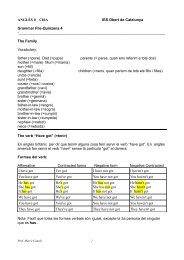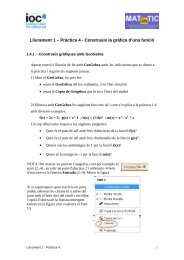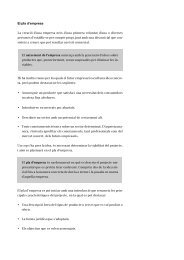GES -Graduat en educació secundària - IOC
GES -Graduat en educació secundària - IOC
GES -Graduat en educació secundària - IOC
You also want an ePaper? Increase the reach of your titles
YUMPU automatically turns print PDFs into web optimized ePapers that Google loves.
unit 1: All about you<br />
<strong>GES</strong> -<strong>Graduat</strong> <strong>en</strong> <strong>educació</strong> <strong>secundària</strong>
<strong>GES</strong> All about you<br />
Índex<br />
Introducció ............................................................................................... 5<br />
Objectius ................................................................................................... 6<br />
1. Let’s communicate ............................................................................. 7<br />
1.1. Converses bàsiques per interessar-vos<br />
per l’estat d’altres persones ....................................................... 7<br />
1.2. Converses bàsiques per parlar de la família ............................ 7<br />
2. Words and expressions ...................................................................... 9<br />
2.1. Salutacions i comiats (Greetings) .............................................. 9<br />
2.2. De què treballes? (What do you do or what’s your job?) .........<br />
2.3. Expressions habituals per parlar<br />
de les activitats de lleure i les preferències<br />
9<br />
(Leisure activities and hobbies) ................................................. 10<br />
2.4. La família i els amics (Fri<strong>en</strong>ds and family) ............................. 11<br />
2.5. Preposicions de temps (Prepositions of time) ....................... 12<br />
3. Grammar ............................................................................................. 15<br />
3.1. Verb to be (revision) ................................................................... 15<br />
3.2. Verb to have (got) (revision) ...................................................... 15<br />
3.3. Pres<strong>en</strong>t simple (revision) ........................................................... 16<br />
3.4. El verb like (agradar) (revision) ................................................ 19<br />
3.5. Respostes curtes (Short answers) (revision) ........................... 19<br />
4. Read and write .................................................................................... 21<br />
4.1. Entrevista a un personatge famós ............................................ 21<br />
5. Life and language (NO ENTRA A L'AVALUACIÓ)......................... 22<br />
5.1. Carta formal. Parts d’una carta (A formal letter) .................... 22
Objectius<br />
En acabar la unitat didàctica, heu de ser capaços del segü<strong>en</strong>t:<br />
1. Compr<strong>en</strong>dre i produir expressions de salutació i comiat.<br />
6 All about you<br />
2. Compr<strong>en</strong>dre i produir les expressions més bàsiques per parlar de<br />
la família.<br />
3. Dir quina és la vostra feina i la d’altres persones.<br />
4. Utilitzar les preposicions de temps.<br />
5. Utilitzar els dies de la setmana.<br />
6. Compr<strong>en</strong>dre i produir expressions per parlar de les activitats de<br />
lleure i les preferències.<br />
7. Utilitzar els verbs to be i to have (formes afirmativa, negativa i in-<br />
terrogativa).<br />
8. Conjugar els verbs <strong>en</strong> pres<strong>en</strong>t simple.<br />
9. Compr<strong>en</strong>dre textos escrits d’informació personal molt bàsics.
1. Let’s communicate<br />
7 All about you<br />
1.1. Converses bàsiques per interessar-vos per l’estat d’altres<br />
persones<br />
Lucy i Ann són dues amigues que fa temps que no es veu<strong>en</strong> i, per tant,<br />
parl<strong>en</strong> de les novetats que hi ha hagut a les seves vides. Llegiu at<strong>en</strong>tam<strong>en</strong>t<br />
el diàleg. (Read the following dialogue paying att<strong>en</strong>tion to the verbs, greetings,<br />
common expressions and vocabulary.)<br />
Fixeu-vos <strong>en</strong> els verbs que ja coneixeu com like (agradar), el verb<br />
auxiliar have got (t<strong>en</strong>ir), l’auxiliar do, que apareix <strong>en</strong> 3a persona<br />
singular (does).Observeu les expressions habituals de salutació<br />
(hello) i comiat (see you), de contacte (how are you?)<br />
i els adjectius de nacionalitat (English, Irish...).<br />
Dialogue A Diàleg A<br />
Ann: Hello, Lucy. How are you?<br />
Lucy: Oh, hi, Ann. Not bad, not bad.<br />
Ann: And how’s your father?<br />
Lucy: Oh, he’s very well now, thanks. And you, Ann?<br />
How are you?<br />
Ann: Fine, thanks. Yes, very fine: I’ve got a new<br />
boyfri<strong>en</strong>d.<br />
Lucy: Have you? Is he good-looking?<br />
Ann: Yes, he is very good-looking. He’s tall and<br />
dark.<br />
Lucy: What does he do?<br />
Ann: He’s a mechanic.<br />
Lucy: Is he English?<br />
Ann: English? No, he’s Irish. He’s from Dublin.<br />
Lucy: Well, congratulations Ann but now I have to<br />
leave. See you soon, Ann.<br />
Ann: See you, Lucy.<br />
1.2. Converses bàsiques per parlar de la família<br />
Ann: Hola, Lucy. Com estàs?<br />
Lucy: Hola, Ann. No em puc queixar.<br />
Ann: I com està el teu pare?<br />
Lucy: Oh. Ara està molt millor, gràcies. I com<br />
estàs tu, Ann?<br />
Ann: Bé, gràcies. Estic molt bé: tinc un xicot nou.<br />
Lucy: De debò?, és guapo?<br />
Ann: Sí, és molt guapo. És alt i mor<strong>en</strong>o.<br />
Lucy: Quina és la seva feina?<br />
Ann: És mecànic.<br />
Lucy: És anglès?<br />
Ann: anglès? No, és irlandès. De Dublín.<br />
Lucy: Bé, <strong>en</strong>horabona, Ann, però ara me n’haig<br />
d’anar. A reveure, Ann.<br />
Ann: A reveure, Lucy.<br />
En el segü<strong>en</strong>t diàleg la Júlia <strong>en</strong>s parlarà sobre les activitats de lleure (lei-<br />
sure activities) que a la seva família els agrada o no practicar.<br />
Fixeu-vos que el text està redactat <strong>en</strong> pres<strong>en</strong>t simple i <strong>en</strong> primera<br />
persona del plural (we’ve got, we’re, we love) i <strong>en</strong> tercera persona<br />
del singular (she doesn’t like, she likes).<br />
!!<br />
Ara aneu al web del material i feu<br />
l’activitat d’apr<strong>en</strong><strong>en</strong>tatge 1<br />
correspon<strong>en</strong>t al tema “Let’s<br />
communicate”.
8 All about you<br />
Julia’s family La família de la Júlia<br />
My name’s Julia. I’ve got a brother (his name’s<br />
John) and two sisters, Paula and Carrie. We’ve all<br />
got dark hair and gre<strong>en</strong> eyes, and we’re all thin<br />
except Paula –she’s quite plump. John is very<br />
handsome and very intellig<strong>en</strong>t. We love practising<br />
sports. In winter we like skiing and in the summer we<br />
like swimming in the beach. We all like sports except<br />
Paula –she doesn’t like them at all. She likes going<br />
to the cinema or reading mystery novels.<br />
Em dic Júlia. Tinc un germà (<strong>en</strong> John) i dues<br />
germanes, la Paula i la Carrie. Tots t<strong>en</strong>im cabells<br />
foscos i ulls verds, I som prims, tots m<strong>en</strong>ys la<br />
Paula, ella és grassoneta. En John és molt<br />
guapo i intel·lig<strong>en</strong>t. Ens <strong>en</strong>canta practicar<br />
esports. A l’hivern <strong>en</strong>s agrada esquiar i a l’estiu<br />
<strong>en</strong>s agrada nedar a la platja. A tots <strong>en</strong>s agrad<strong>en</strong><br />
els esports m<strong>en</strong>ys a la Paula –a ella no li agrad<strong>en</strong><br />
g<strong>en</strong>s. Ella prefereix anar al cinema o llegir<br />
novel·les de misteri, però jo odio el cinema.<br />
!!<br />
Ara aneu al web del material i feu<br />
l’activitat d’apr<strong>en</strong><strong>en</strong>tatge 2<br />
correspon<strong>en</strong>t al tema “Let’s<br />
communicate”.
2. Words and expressions<br />
2.1. Salutacions i comiats (Greetings)<br />
Les salutacions i comiats <strong>en</strong> anglès s’anom<strong>en</strong><strong>en</strong> greetings. !<br />
9 All about you<br />
Les salutacions i comiats més freqü<strong>en</strong>ts <strong>en</strong> anglès són els segü<strong>en</strong>ts:<br />
Salutacions. Quan s’arriba a un lloc es diu:<br />
Hello! o hi! Hola!<br />
Good morning! Bon dia!<br />
Good afternoon! Bona tarda!<br />
Good ev<strong>en</strong>ing! Bona tarda / bon vespre!<br />
Hi és més col·loquial que hello. !<br />
Comiats. Quan algú se’n va d’un lloc diu:<br />
Goodbye! Adéu<br />
Bye-bye! Adéu<br />
See you! A reveure!<br />
Good night! Bona nit!<br />
Tant see you! com bye-bye! són més col·loquials que goodbye! !<br />
Aquesta última expressió, good night! (bona nit!), la fem servir únicam<strong>en</strong>t<br />
quan <strong>en</strong>s acomiadem d’algú a la nit, a l’hora de retirar-nos,<br />
mai <strong>en</strong> el mom<strong>en</strong>t d’arribar com fem <strong>en</strong> català.<br />
2.2. De què treballes? (What do you do or what’s your job?)<br />
Feina, ofici o professió es diu job <strong>en</strong> anglès.<br />
Per preguntar a algú de què treballa <strong>en</strong> anglès es pots fer de dues maneres.<br />
Fixeu-vos <strong>en</strong> les preguntes i la resposta:<br />
What’s your job? I am a doctor. (Quina és la teva feina? Sóc metge.)<br />
What do you do?<br />
!!<br />
Ara aneu al web del material i feu<br />
l’activitat d’apr<strong>en</strong><strong>en</strong>tatge 1<br />
correspon<strong>en</strong>t al tema “Words and<br />
expressions”.
What’s his job? He is a teacher. (Quina és la seva feina? Ell és professor.)<br />
What does he do?<br />
What’s her job? She is an <strong>en</strong>gineer. (Quina és la seva feina? Ella és <strong>en</strong>ginyera.)<br />
What does she do?<br />
Per exemple:<br />
• He is doctor: He is a doctor<br />
• She is stud<strong>en</strong>t: She is a stud<strong>en</strong>t<br />
10 All about you<br />
Recordeu que cal escriure l’article a/an davant del nom de l’ofici.<br />
2.3. Expressions habituals per parlar de les activitats de lleure i les<br />
preferències (Leisure activities and hobbies)<br />
Per dir si <strong>en</strong>s agrada fer una determinada activitat o no, s’utilitza el<br />
verb like seguit de la forma verbal acabada <strong>en</strong> -ing.<br />
• I like + verb -ing form<br />
• I don’t like + verb -ing form<br />
Per exemple:<br />
• I like dancing. (M’agrada ballar.)<br />
• I don’t like dancing. (No m’agrada ballar.)<br />
Les imatges segü<strong>en</strong>ts repres<strong>en</strong>t<strong>en</strong> activitats de lleure i <strong>en</strong>tret<strong>en</strong>im<strong>en</strong>t.<br />
Cada activitat fa referència a una acció (cuinar, llegir, etc.). Observeu-<br />
les at<strong>en</strong>tam<strong>en</strong>t i apr<strong>en</strong>eu els verbs que repres<strong>en</strong>t<strong>en</strong> aquestes accions.<br />
Cooking Reading Playing football<br />
!!<br />
Ara aneu al web del material i feu<br />
les activitats d’apr<strong>en</strong><strong>en</strong>tatge 2 i 3<br />
correspon<strong>en</strong>ts al tema “Words and<br />
expressions”.<br />
Watching TV Walking
2.4. La família i els amics (Fri<strong>en</strong>ds and family)<br />
11 All about you<br />
Swimming Going out with fri<strong>en</strong>ds Dancing Using computers<br />
List<strong>en</strong>ing to music Travelling Eating in restaurants Going to the cinema<br />
Heu après el mots: fri<strong>en</strong>d (amic,-ga), boyfri<strong>en</strong>d, girfri<strong>en</strong>d (xicot,a)<br />
Ara aneu al web del material i feu<br />
Fixeu-vos <strong>en</strong> la família: par<strong>en</strong>ts (mother,father) > Pares<br />
les activitats d’apr<strong>en</strong><strong>en</strong>tatge 4 i 5<br />
correspon<strong>en</strong>ts al tema “Words and<br />
sister(germana), brother (germà), son (fill), daughter (filla) > Fills<br />
expressions”.<br />
grandmother (àvia), grandfather (avi), aunt (tia) uncle (tio), niece (neboda), nephew (nebot)<br />
!!<br />
!!<br />
Ara aneu al web del material i feu<br />
l’activitat d’apr<strong>en</strong><strong>en</strong>tatge 6<br />
correspon<strong>en</strong>t al tema “Words and<br />
expressions”.
2.5. Preposicions de temps (Prepositions of time)<br />
On<br />
Per exemple:<br />
• I go to the gym on Friday. (Vaig al gimnàs el div<strong>en</strong>dres.)<br />
In<br />
Per exemple:<br />
• I study English in the morning. (Estudio anglès al matí.)<br />
12 All about you<br />
On, in i at són les preposicions de temps més usuals <strong>en</strong> anglès.<br />
On es fa servir sempre acompanyant els dies de la setmana.<br />
Dies de la setmana (Days of the week)<br />
Monday Dilluns<br />
Tuesday Dimarts<br />
Wednesday Dimecres<br />
Thurdsay Dijous<br />
Friday Div<strong>en</strong>dres<br />
Saturday Dissabte<br />
Sunday Dium<strong>en</strong>ge<br />
Recordeu que els dies de la setmana <strong>en</strong> anglès van sempre <strong>en</strong> majúscula,<br />
a diferència del català. I week<strong>en</strong>d és cap de setmana.<br />
In es fa servir amb els mesos de l’any, amb les parts del dia i amb<br />
les estacions.<br />
Parts del dia (Time of day)<br />
Morning Matí<br />
Afternoon Tarda<br />
Ev<strong>en</strong>ing Vespre<br />
Night Nit<br />
• I study English in the afternoon. (Estudio anglès a la tarda.)
• I study English in the ev<strong>en</strong>ing. (Estudio anglès al vespre.)<br />
• I study English at night. (Estudio anglès a la nit.)<br />
Fixeu-vos, però: I study English in the night.<br />
Per exemple:<br />
• My birthday is in June. (El meu aniversari és al juny.)<br />
Per exemple:<br />
13 All about you<br />
Però I study English on Monday morning. (Estudio anglès el di-<br />
lluns al matí.)<br />
Els mesos de l’any <strong>en</strong> anglès, a diferència del català, van sempre<br />
<strong>en</strong> majúscula.<br />
• I like going to the beach in summer. (M’agrada anar a la platja a<br />
l’estiu.)<br />
• My gard<strong>en</strong> is full of flowers in spring. (El meu jardí és ple de flors<br />
a la primavera.)<br />
Mesos de l’any (Months of the year)<br />
January G<strong>en</strong>er<br />
February Febrer<br />
March Març<br />
April Abril<br />
May Maig<br />
June Juny<br />
July Juliol<br />
August Agost<br />
September Setembre<br />
October Octubre<br />
November Novembre<br />
December Desembre<br />
Estacions (Seasons)<br />
Summer Estiu<br />
Autumn Tardor<br />
Winter Hivern<br />
Spring Primavera
At<br />
Per exemple:<br />
14 All about you<br />
At es fa servir amb unes expressions <strong>en</strong> concret i amb les hores.<br />
• I visit my fri<strong>en</strong>ds at the week<strong>en</strong>d. (Visito els meus amics el cap de set-<br />
mana.)<br />
Altres expressions temporals<br />
Week<strong>en</strong>d Cap de setmana<br />
Midday Migdia<br />
Midnight Mitja nit<br />
• I get up at 7 o’clock. (Em llevo a les 7 <strong>en</strong> punt.)<br />
!!<br />
Ara aneu al web del material i feu<br />
les activitats d’apr<strong>en</strong><strong>en</strong>tatge 7 i 8<br />
correspon<strong>en</strong>ts al tema “Words and<br />
expressions”.
3. Grammar<br />
3.1. Verb to be (revision)<br />
15 All about you<br />
El verb to be (ser o estar) és un verb irregular d’ús molt freqü<strong>en</strong>t que<br />
consta d’una forma llarga (long form) i una forma contreta (short<br />
form). Les formes verbals <strong>en</strong> negreta correspon<strong>en</strong> a les formes contre-<br />
tes (short form), que són molt habituals i es caracteritz<strong>en</strong> per la subs-<br />
titució, <strong>en</strong> aquest cas, de la primera vocal de la forma verbal per un<br />
apòstrof.<br />
La forma verbal s<strong>en</strong>se contraure (s<strong>en</strong>se apòstrof) s’anom<strong>en</strong>a <strong>en</strong> anglès<br />
long form (forma llarga).<br />
Recordeu que fem servir sempre el verb to be per parlar de l’edat<br />
d’una persona.<br />
Per exemple:<br />
• She’s 32 years old. (Té 32 anys.)<br />
3.2. Verb to have got (revision)<br />
Pres<strong>en</strong>t simple to be<br />
Affirmative Affirmative<br />
Long form Short form Long form Short form<br />
I am I’m I am not I’m not Am I?<br />
You are You’re You are not You ar<strong>en</strong>’t Are you?<br />
He is He’s He is not He isn’t Is he?<br />
She is She’s She is not She isn’t Is she?<br />
It is It’s It is not It isn’t Is it?<br />
We are We’re We are not We ar<strong>en</strong>’t Are we?<br />
They are They’re They are not They ar<strong>en</strong>’t Are they?<br />
El verb have got (t<strong>en</strong>ir/haver) és un verb irregular d’ús molt freqü<strong>en</strong>t<br />
que consta d’una forma llarga i d’una forma curta (forma contreta), que<br />
s’utilitza sovint <strong>en</strong> ll<strong>en</strong>gua col·loquial.<br />
Interrogative<br />
!!<br />
Ara aneu al web del material i feu<br />
l’activitat d’apr<strong>en</strong><strong>en</strong>tatge 1<br />
correspon<strong>en</strong>t al tema “Grammar”.
Per fer frases interrogatives cal seguir el model segü<strong>en</strong>t:<br />
• Have you got a p<strong>en</strong>? (T<strong>en</strong>s un bolígraf?)<br />
Per exemple:<br />
• I have got an American fri<strong>en</strong>d. (Tinc un amic americà.)<br />
• He has got a daughter. (Ell té una filla.)<br />
Per exemple:<br />
16 All about you<br />
• We have a coffee for breakfast. (Pr<strong>en</strong>em un cafè per esmorzar.)<br />
• John has a shower in the morning. (El John pr<strong>en</strong> una dutxa al matí.)<br />
3.3. Pres<strong>en</strong>t simple (revision)<br />
To have got - pres<strong>en</strong>t simple<br />
Affirmative Negative<br />
Long form Short form Long form Short form<br />
Interrogative<br />
I have got I’ve got I have not got I hav<strong>en</strong>’t got Have I got…?<br />
You have got You’ve got You have not got You hav<strong>en</strong>’t got Have you got…?<br />
He / She / It has got He’s / she’s / it’s got He / she / it has not got He / she / it hasn’t got Has she / he / it got…?<br />
We have got We’ve got We have not got We hav<strong>en</strong>’t got Have we got…?<br />
You have got You’ve got You have not got You hav<strong>en</strong>’t got Have you got…?<br />
They have got They’ve got They have not got They hav<strong>en</strong>’t got Have they got…?<br />
Fixeu-vos <strong>en</strong> la forma de la 3a persona del singular: he / she / it<br />
has. Totes les formes del pres<strong>en</strong>t del verb to have got són iguals<br />
(have), excepte la 3a persona del singular, que porta una -s final<br />
(has).<br />
El verb to have got normalm<strong>en</strong>t s’utilitza amb el significat de t<strong>en</strong>ir.<br />
D’altra banda, el verb to have s’utilitza amb el significat de pr<strong>en</strong>dre<br />
<strong>en</strong> algunes expressions:<br />
El pres<strong>en</strong>t simple <strong>en</strong> anglès s’utilitza per parlar d’hàbits o d’accions<br />
que esdev<strong>en</strong><strong>en</strong> amb regularitat (habitual actions).<br />
Fixeu-vos que s’escriu el subjecte<br />
després del verb.<br />
!!<br />
Ara aneu al web del material i feu<br />
l’activitat d’apr<strong>en</strong><strong>en</strong>tatge 2<br />
correspon<strong>en</strong>t al tema “Grammar”.
Per exemple:<br />
• I get up early. (Jo em llevo d’hora = és un hàbit.)<br />
• I go to the gym. (Jo vaig al gimnàs = és una acció habitual.)<br />
Per exemple:<br />
17 All about you<br />
El pres<strong>en</strong>t simple també s’utilitza per parlar de coses que són sem-<br />
pre certes (things that are always true).<br />
• The water boils at 100 ºC. (L’aigua bull als 100 graus = sempre bull a<br />
aquesta temperatura.)<br />
• The earth is round. (La terra és rodona = sempre és rodona.)<br />
Quan parlem de les coses que fem habitualm<strong>en</strong>t, fem servir uns ad-<br />
verbis per indicar la freqüència <strong>en</strong> què realitzem aquesta activitat.<br />
Són els anom<strong>en</strong>ats frequ<strong>en</strong>cy adverbs.<br />
Per exemple:<br />
• I never practise sports. (Mai practico esports = acció no habitual.)<br />
• I always work at the week<strong>en</strong>ds. (Treballo sempre els caps de setmana.)<br />
Conjugació del pres<strong>en</strong>t simple<br />
Forma afirmativa del verb play (jugar)<br />
I play<br />
You play<br />
He/she/it plays<br />
We play<br />
You play<br />
They play<br />
Fixeu-vos que totes les persones t<strong>en</strong><strong>en</strong> la mateixa forma (que coincideix<br />
amb la forma de l’infinitiu s<strong>en</strong>se to), excepte la tercera persona<br />
del singular, que acaba <strong>en</strong> -s.<br />
Hi ha una sèrie de verbs que <strong>en</strong> lloc de -s afegeix<strong>en</strong> -es a la tercera<br />
persona dels singular. Són els segü<strong>en</strong>ts:<br />
Els infinitius acabats <strong>en</strong> -s, -sh, -ch, -x i -o afegeix<strong>en</strong> -es a la 3a persona<br />
del singular.<br />
!!<br />
Estudiareu els frequ<strong>en</strong>cy adverbs<br />
amb més profunditat <strong>en</strong> la unitat<br />
segü<strong>en</strong>t.
Per exemple:<br />
Per exemple:<br />
Forma negativa<br />
Per exemple:<br />
• He likes biology. > He doesn’t like biology.<br />
• She goes to the library. > She doesn’t go to the library.<br />
Forma interrogativa<br />
18 All about you<br />
-s miss (<strong>en</strong>yorar) he / she / it misses<br />
-sh wash (r<strong>en</strong>tar) he / she / it washes<br />
-ch watch (mirar) + -es he / she / it watches<br />
-x fix (<strong>en</strong>ganxar) he / she / it fixes<br />
-o go (anar) he / she / it goes<br />
Els infinitius acabats <strong>en</strong> consonant + -y fan la tercera persona <strong>en</strong> -ies.<br />
-ies study (estudiar) -ies he / she / it studies<br />
Per fer la forma negativa del pres<strong>en</strong>t simple s’utilitza el verb auxiliar<br />
do not (per a I, you, we i they) / does not (per a he, she, it, 3a persona<br />
del singular):<br />
Forma negativa<br />
Long form Short form<br />
I do not play don’t play<br />
You do not play don’t play<br />
He/she/it does not play doesn’t play<br />
We do not play don’t play<br />
You do not play don’t play<br />
They do not play don’t play<br />
Fixeu-vos que amb la tercera persona del singular (he, she, it) la forma<br />
negativa es forma amb does not > doesn’t i el verb principal perd la -s.<br />
Per fer frases interrogatives <strong>en</strong> pres<strong>en</strong>t simple s’utilitza el verb auxiliar<br />
do. L’ordre dels elem<strong>en</strong>ts de la frase queda així: do/does +<br />
subjecte + verb.<br />
!!<br />
Ara aneu al web del material i feu<br />
les activitats d’apr<strong>en</strong><strong>en</strong>tatge 3, 4<br />
i 5 correspon<strong>en</strong>ts al tema<br />
“Grammar”.
3.4. El verb like (agradar) (revision)<br />
19 All about you<br />
En el tema “Words and expressions” d’aquesta unitat ja heu vist que per<br />
expressar els nostres gustos i les nostres preferències <strong>en</strong> anglès s’utilitza<br />
el verb like.<br />
Per dir si <strong>en</strong>s agrada fer una determinada activitat o no, s’utilitza el<br />
verb like seguit de la forma verbal acabada <strong>en</strong> -ing.<br />
• I like + verb -ing form<br />
• I don’t like + verb -ing form<br />
Per exemple:<br />
• I like reading. (M’agrada llegir.)<br />
• I don’t like cooking. (No m’agrada cuinar.)<br />
Per dir si <strong>en</strong>s agrada una cosa o no, s’utilitza el verb like seguit del<br />
nom correspon<strong>en</strong>t.<br />
• I like + noun<br />
• I don’t like + noun<br />
Per exemple:<br />
• I like horror films. (M’agrad<strong>en</strong> les pel·lícules de terror.)<br />
• I don’t like history. (No m’agrada la història.)<br />
3.5. Respostes curtes (Short answers) (revision)<br />
Hi ha preguntes que només pod<strong>en</strong> t<strong>en</strong>ir un sí o un no per resposta.<br />
Les respostes curtes (sí o no) s’anom<strong>en</strong><strong>en</strong> short answers i seguei-<br />
x<strong>en</strong> sempre l’estructura:<br />
Yes o no + pronom personal + verb to be.<br />
Fixa’t però, que s’apostrofa sempre la frase curta <strong>en</strong> negació.<br />
!!<br />
Ara aneu al web del material i feu<br />
l’activitat d’apr<strong>en</strong><strong>en</strong>tatge 6<br />
correspon<strong>en</strong>t al tema “Grammar”.
Llegiu:<br />
Verb to be<br />
Am I a nurse? Yes, I am. Yes, I’m No, I’m not.<br />
Are you a nurse?<br />
Is she a nurse? Yes, she is. No, she isn’t.<br />
Is he a nurse? Yes, he is. No, he isn’t.<br />
Are we nurses? Yes, we are. No, we ar<strong>en</strong>’t.<br />
Are you nurses? Yes, you are. No, you ar<strong>en</strong>’t.<br />
Are they nurses? Yes, they are. No, they ar<strong>en</strong>’t.<br />
Verb to have got<br />
Have I got a car? Yes, I have. No, I hav<strong>en</strong>’t.<br />
Have you got a car?<br />
Has she got a car? Yes, she has. No, she hasn’t.<br />
Has he got a car? Yes, he has. No, he hasn’t.<br />
Have we got a car? Yes, we have. No, we hav<strong>en</strong>’t.<br />
Have you got a car? Yes, you have. No, you hav<strong>en</strong>’t.<br />
Have they got a car? Yes, they have. No, they hav<strong>en</strong>’t.<br />
Fixeu-vos que <strong>en</strong> la resposta curta no posem la partícula got.<br />
Verb to do<br />
Do I like apples? Yes, I do. No, I don’t.<br />
Do you like the cinema?<br />
Does she like fish? Yes, she does. No, she doesn’t.<br />
Does he like fish? Yes, he does. No, he doesn’t.<br />
Do we like meat? Yes, we do. No, we don’t.<br />
Do you like beer? Yes, we do. No, we don’t.<br />
Do they like reading? Yes, they do. No, they don’t.<br />
20 All about you<br />
!!<br />
Ara aneu al web del material i feu<br />
les activitats d’apr<strong>en</strong><strong>en</strong>tatge 7 i 8<br />
correspon<strong>en</strong>ts al tema<br />
“Grammar”.
4. Read and write<br />
4.1. Entrevista a un personatge famós<br />
A continuació llegireu una <strong>en</strong>trevista feta a Pau Gasol.<br />
21 All about you<br />
Fixeu-vos <strong>en</strong> les expressions que apareix<strong>en</strong> <strong>en</strong> el text per obt<strong>en</strong>ir informació<br />
dels altres (information questions), les salutacions (greetings)<br />
i el tipus de frases curtes (short answers).<br />
Pau Gasol’s interview<br />
(Interviewer: I)<br />
(Pau Gasol: P)<br />
I: Good morning, Pau.<br />
P: Good morning.<br />
I: Can I ask you some questions for my sports magazine?<br />
P: Yes, of course.<br />
I: Where are you from?<br />
P: I’m from Catalonia.<br />
I: How old are you, Pau?<br />
P: I’m 24.<br />
I: What’s your job?<br />
P: I’m a basket player.<br />
I: How tall are you?<br />
P: I’m 2 metres 15.<br />
I: Have you got any brothers or sisters?<br />
P: Yes, I have. I’ve got 2 brothers.<br />
I: Do you like sports?<br />
P: Yes, I do. I like playing basketball very much.<br />
I: Do you like living in the United States?<br />
P: Yes, I do.<br />
I: What do you like doing in your free time?<br />
P: I like going out with my fri<strong>en</strong>ds and reading.<br />
I: Well, I think is <strong>en</strong>ough. Thank you very much and good-bye.<br />
P: Ok, bye.<br />
!!<br />
Ara aneu al web del material i feu<br />
l’activitat d’apr<strong>en</strong><strong>en</strong>tatge 1<br />
correspon<strong>en</strong>t al tema “Read and<br />
write”.<br />
Entrevista a Pai Gasol<br />
(Entrevistador: E)<br />
(Pau: P)<br />
E: Bon dia, Pau.<br />
P: Bon dia.<br />
E: Puc fer-te unes preguntes per a la meva revista d’esports?<br />
P: Naturalm<strong>en</strong>t.<br />
E: D’on ets?<br />
P: De Catalunya<br />
E: Quina edat t<strong>en</strong>s?<br />
P: 24 anys.<br />
E: Quina és la teva feina?<br />
P: Sóc jugador de bàsquet.<br />
E: Quina alçada t<strong>en</strong>s?<br />
P: 2,15 cm.<br />
E: T<strong>en</strong>s germans?<br />
P: Sí, tinc 2 germans.<br />
E: T’agrad<strong>en</strong> els esports?<br />
P Sí, m’agrad<strong>en</strong>. M’agrada molt jugar a bàsquet.<br />
E: T’agrada viure als Estats Units?<br />
P: Sí, m’agrada.<br />
E: Què t’agrada fer <strong>en</strong> el teu temps lliure?<br />
P: M’agrada sortir amb els amics i llegir.<br />
E: Bé, crec que és sufici<strong>en</strong>t. Moltes gràcies i Adéu.<br />
P: OK, adéu.
<strong>GES</strong>-<strong>Graduat</strong> <strong>en</strong> <strong>educació</strong> <strong>secundària</strong> 1 unit 1: All about you<br />
ACTIVITATS D’AVALUACIÓ<br />
Activitat 1<br />
Escriu les preguntes adequades.. (Make questions)<br />
ex. your mother/ a nurse> Is your mother a nurse?<br />
a) your dog/ black<br />
_________________________________<br />
b) Paula / pretty<br />
_________________________________<br />
c) their par<strong>en</strong>ts / at home<br />
_________________________________<br />
d) My childr<strong>en</strong> / good-looking<br />
_________________________________<br />
e) His brother / doctor<br />
_________________________________<br />
f) your boyfri<strong>en</strong>d / Japanese<br />
_________________________________<br />
g) you and your sister / tall<br />
_________________________________<br />
h) your surname / Smith<br />
_________________________________<br />
Activitat 2<br />
Translate into your language.<br />
a) I have a shower every morning.<br />
_________________________________<br />
b) Let’s have a drink after work!<br />
_________________________________<br />
c) We have lunch at 2 pm.<br />
_________________________________<br />
d) We’ve got lots of fri<strong>en</strong>ds.<br />
_________________________________<br />
e) She’s got a beautiful house near the beach.<br />
_________________________________<br />
f) They’ve got three boys and one girl.<br />
_________________________________
<strong>GES</strong>-<strong>Graduat</strong> <strong>en</strong> <strong>educació</strong> <strong>secundària</strong> 2 unit 1: All about you<br />
g) The cat has got a tail.<br />
_________________________________<br />
h) She has supper very late.<br />
_________________________________<br />
Activitat 3<br />
Escriu do o does segons convingui. (Write the auxiliary do or does in each blank.)<br />
a) ___________ your mother work in a hospital?<br />
b) What time ___________ you finish your English lesson?<br />
c) Where ___________ she have breakfast?<br />
d) ___________ your grandmother live in England?<br />
e) Where ___________ you come from?<br />
f) ___________ you like your house?<br />
g) How many languages ___________ you speak?<br />
Activitat 4<br />
Vocabulari.Afegeix 4 paraules més a cadascuna de les llistes. (Vocabulary. Add 4 words in each of these<br />
lists.)<br />
a) brother, sister, …<br />
b) Saturday, …<br />
c) teacher, …<br />
Activitat 5<br />
Respon amb una frase curta. (Answer these questions - Use a short answer)<br />
a) Have they got any childr<strong>en</strong>? _________________<br />
b) Is Julia Roberts fat? _________________<br />
c) Do you like reading? _________________<br />
d) Are you married? _________________<br />
e) Do you work on Sundays? _________________<br />
f) Have you got a bicycle? _________________<br />
g) Is Elton John English? _________________<br />
h) Has he got a flat? _________________<br />
Activitat 6<br />
Troba els 5 verbs. ( Find the 5 verbs.)
<strong>GES</strong>-<strong>Graduat</strong> <strong>en</strong> <strong>educació</strong> <strong>secundària</strong> 3 unit 1: All about you<br />
A M L C A N<br />
N T R S E L<br />
B E O L S T<br />
K I L O V E<br />
O H A V E Y<br />
K I B U Y B<br />
B U T G O N<br />
Activitat 7<br />
Quina paraula és difer<strong>en</strong>t de la resta? (Which word is differ<strong>en</strong>t?)<br />
a) morning hour ev<strong>en</strong>ing night<br />
b) hello bye late hi<br />
c) sell doctor stud<strong>en</strong>t secretary<br />
d) goes watches ladies washes<br />
Activitat 8<br />
Escriu la tercera persona singular dels segü<strong>en</strong>ts verbs. (Write the third person (he/she/it) forms of the<br />
following verbs)<br />
a) cook _________________ e) eat _________________<br />
b) learn _________________ f) play _________________<br />
c) read _________________ g) talk _________________<br />
d) live _________________ h) write _________________
<strong>GES</strong>-<strong>Graduat</strong> <strong>en</strong> <strong>educació</strong> <strong>secundària</strong> 4 unit 1: All about you<br />
SOLUCIONS DE LES ACTIVITATS D’AVALUACIÓ<br />
Activitat 1<br />
a) Is your dog black?<br />
b) Is Paula pretty?<br />
c) Are their par<strong>en</strong>ts at home?<br />
d) Are my childr<strong>en</strong> good-looking?<br />
e) Is his brother a doctor?<br />
f) Is your boyfri<strong>en</strong>d Japanese?<br />
g) Are you and your sister tall?<br />
h) Is your surname Smith?<br />
Activitat 2<br />
a) Em dutxo cada matí.<br />
b) Anem a pr<strong>en</strong>dre una copa després de la feina!<br />
c) Dinem a les dues.<br />
d) T<strong>en</strong>im molts amics.<br />
e) Té una casa meravellosa a prop de la platja.<br />
f) T<strong>en</strong><strong>en</strong> tres nois i una noia.<br />
g) El gat té cua.<br />
h) Sopa molt tard.<br />
Activitat 3<br />
a) Does your mother work in a hospital?<br />
b) What time do you finish your English lesson?<br />
c) Where does she have breakfast?<br />
d) Does your grandmother live in England?<br />
e) Where do you come from?<br />
f) Do you like your house?<br />
g) How many languages do you speak?<br />
Activitat 4<br />
Resposta ori<strong>en</strong>tativa<br />
a) brother, sister, mother, father, daughter, son.<br />
b) Saturday, Sunday, Monday, Tuesday, Wednesday.<br />
c) teacher, waiter, hairdresser, secretary, cleaner.
<strong>GES</strong>-<strong>Graduat</strong> <strong>en</strong> <strong>educació</strong> <strong>secundària</strong> 5 unit 1: All about you<br />
Activitat 5<br />
a) Have they got any childr<strong>en</strong>? Yes, they have /No, they hav<strong>en</strong>’t.<br />
b) Is Julia Roberts fat? No, she isn’t.<br />
c) Do you like reading? Yes, I do/No, I don’t.<br />
d) Are you married? Yes, I am/ No, I’m not.<br />
e) Do you work on Sundays? Yes, I do/ No, I don’t.<br />
f) Have you got a bicycle? Yes, I have/ No, I hav<strong>en</strong>’t.<br />
g) Is Elton John English? Yes, he is.<br />
h) Has he got a flat? Yes, he has /No, he hasn’t.<br />
Activitat 6<br />
A M L C A N<br />
N T R S E L<br />
B E O L S T<br />
K I L O V E<br />
O H A V E Y<br />
K I B U Y B<br />
B U T G O N<br />
Activitat 7<br />
a) morning hour ev<strong>en</strong>ing night<br />
b) hello bye late hi<br />
c) sell doctor stud<strong>en</strong>t secretary<br />
d) goes watches ladies washes<br />
Activitat 8<br />
a) cooks b) learns c) reads d) lives<br />
e) eats f) plays g) talks h) writes



